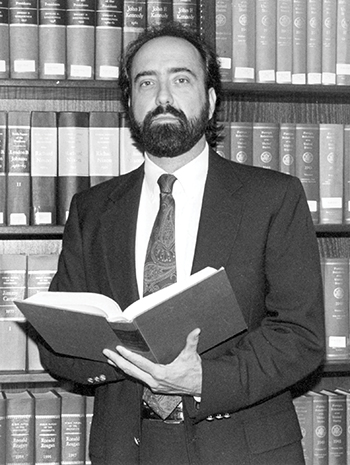Renal Cell Carcinoma Survivor
Unexpected blessings accompany Stage IV diagnosis

Award-winning historian and author Phillip Thomas Tucker is astonishingly successful at giving his Stage IV renal cell carcinoma diagnosis only the attention it needs. He takes his medication daily, never misses an infusion and follows doctor’s orders. The rest of his time is spent writing groundbreaking history – something he feels is more deserving of his attention – and he is proud that he reached his goal of publishing more than 100 books of history, especially after beginning cancer treatment.
After being raised and educated in the Midwest, I spent most of my career as a historian for the Department of Defense in Washington, D.C. When I retired at 65, I bought a home in Florida, packed up and made the move on my own. It took a few very physical trips back and forth with a rental truck, but I was in good health and had no problems with the move.
Daily dizziness set in a few months later, so I visited an emergency room. Because I had no other symptoms and was a recent transplant from a much different climate, the doctor thought I might be having an allergic reaction to the plant life in Florida. I wasn’t on board with that diagnosis.
About a month later, an early morning episode was so severe that I went to the same emergency room. I had reservations about going to the same ER because I wasn’t thrilled with my last visit, but this time I saw an intern who took my case in a different direction. He talked with me and performed some diagnostic tests. Without skipping a beat, he requested an MRI. He suspected I had cancer that started in my right kidney and had metastasized.
I was taken by ambulance to a nearby well-known cancer center where I had more tests before meeting with the doctor who would become my oncologist. The intern was correct. My official diagnosis was Stage IV renal cell carcinoma. The oncologist also broke the news that because it had metastasized, there wasn’t a cure. But, he had a plan.
Many people would probably be devastated by a Stage IV diagnosis. I wasn’t. Of course it wasn’t something I enjoyed hearing, especially after just retiring, but I considered my situation. The fact that I’d just been diagnosed with Stage IV cancer and I was a mere 20 miles from a leading cancer center was incredibly fortunate. I had a doctor who was up to speed on the latest medical innovations for my type of cancer. He was so sure about the treatment plan that it made me confident. I had a career that I loved as an author and historian that I would continue to focus on. I began to feel as if I had a little bit of everything going for me.
The first step was to remove a tumor that had metastasized right away, and it was successful. Then I began a combination therapy consisting of an oral targeted therapy that I take on my own along with an immunotherapy drug given by infusion.
A year later my right kidney, where the cancer began, was removed successfully. After a follow-up scan on my liver roughly three years after my diagnosis, I received the wonderful news that there is no visible sign of cancer. I still take the combination therapy because it appears to be doing its job quite well.
Although I approach it in a very matter-of-fact way, the experience hasn’t been without its challenges. I elected not to tell my aging mother about my diagnosis because I thought it would literally do her in. And I couldn’t tell my sister because she and my mom lived in the same small town, and I didn’t want the news to get back to my mom. So, I went through learning I had this serious diagnosis and going through treatment without their help.
I did, however, have the support of a great health care team who knows what they’re doing. When I began to have a reaction after one of my infusions, they added a medication prior to the next treatment and adjusted the length of the infusion. I’ve had other side effects from the drug therapy, but not anything I can’t handle. My doctor and nurses tell me what to do, and I do it. I trust them implicitly — something I encourage for anyone facing a serious health issue to look for in their care. And, to be honest, I really enjoy them. I had forgotten that there were such nice, caring people in the world. I owe everything to them.
I believe the positive mindset I adopted set the stage for my experience, but that is very much my personality. For better or worse, I get more upset at a red light than I do with life-changing matters. But, it allowed me to continue focusing on my writing. I’d set a goal of publishing 100 books in my lifetime, and I surpassed that goal. I was so motivated that I already had 104 books under my belt without even realizing it.
Perhaps the biggest lesson I learned is that it is possible to turn lemons into lemonade by drawing on my inner strength. My hope is that others might find the same type of inspiration.


